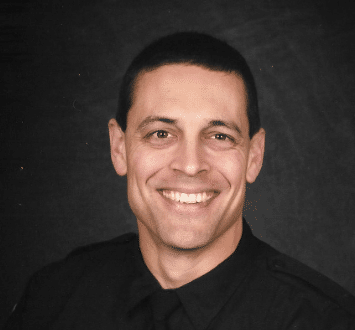EXCLUSIVE: Prioritizing wellbeing for law enforcement officers


Victoria Rees
Share this content
By investing in personal growth, law enforcement officials can improve their resilience, says Author and Police Veteran Scott Medlin.
The challenge of maintaining morale, the dangers of working in law enforcement, high rates of suicide and mental health issues, as well as recruitment and retention problems, are issues that continue to persist in law enforcement.
It’s a lot to handle and should not be underestimated, but it is not a reason to give up. Many law enforcement officers who still wear the weighted badge and gun desire leadership and support. Officers must not discredit themselves from taking charge and being their own leaders while growing as individuals. Surprisingly enough, when you focus on your growth and progress, it will help you weather the storms of the profession even better. Stick with me, because when I hit rock bottom as a police officer, three things became paramount in overcoming it.
Get moving
These are action items you can start implementing right now: movement, gardening and checking your surroundings. I’m sure you’re thinking, “What the heck are you talking about?!” I’ll elaborate because I also thought it was ridiculous when I first learned these crucial steps. So – to you working in law enforcement, you MUST take significant action for yourself, one step at a time, because even if you’re doing good, you can’t be perfect. Do not stop working on you.
Now, when I mention “you can move,” I’m not talking about selling your house, terminating the lease and packing things up in a U-Haul. I’m referring to literally moving your body – many law enforcement professionals go through long periods of being sedentary at work, especially if you have a desk job.
“Yeah, no kidding, Scott. You’re telling me something I didn’t already know.”
Stick with me!
The life of a law enforcement officer outside of the job can be tough enough because life affects all of us. Adding a family on top of that can make it seem even more overwhelming at times. So, how can you snap out of the negativity and funk? Move your body.
Something as simple as rolling your shoulders back, standing up straight, smiling and taking a deep breath can make a world of difference. Then there’s exercise, which doesn’t have to take a ton of time away from your already busy schedule. When you start moving, the body’s feel-good chemicals start moving for you too, counteracting the stress hormones. I kid you not. So, move your body when you’re feeling sad, disgruntled, angry, frustrated, irritable, hopeless – the list goes on.
I’m not saying you will become Mr or Ms Positive Thinker who never gets upset. Please do not take it that way. You will absolutely react to things as the human you are, but when you move your body, you can change your state of being.
Growing stronger
So, you’ve moved your body, be it a posture shift, taking a deep breath, going on a walk or something else! Now it’s time to shift your attention to gardening. I don’t mean planting a garden in your backyard. I’m referring to what Dr Joe Dispenza states as mental gardening. During my cognitive processing therapy treatment for post-traumatic stress disorder and depression, it was revealed to me how many weeds I had growing in my mind – thoughts referred to as ‘stuck points’.
Basically, these were negative thoughts based on memories and emotions from the past that were holding me back from envisioning the future. So, when I would wake up, I wasn’t thinking about the future. Instead, I was thinking about the all too familiar past.
I was a hostage to past stressors and traumatic events, some of which occurred several years ago. It was a significant revelation. So, during therapy, I learned how to reframe these stuck points, which freed up mental space and allowed me to gain clarity for the future. However, if you’re wondering whether it takes a 12-week session of cognitive processing therapy to engage in ‘mental gardening’, the answer is no, it does not.
Take some time
Now, you might despise me when I reveal that the one solid method for mental gardening to eliminate the weeds is meditation. Yes, I stated what I stated. Think about it – would you rather have the negative memories and emotions of police administrators lacking leadership dominate your mind endlessly? Or the negative memories and emotions of the job-related trauma? Or would you rather experience an emotion connected to a vision of the future you want to create, even amid the challenges in your profession?
I understand these questions are difficult to unpack, but meditation also helps to combat stress. You can’t remain in fight or flight mode all the time. No living being can sustain that. So, take a moment to sit down for five to ten minutes and find a free guided meditation on YouTube. Over time, you’ll become familiar with the emotions and thoughts associated with a future, freeing yourself from the control of your past and letting your mind relax. So, practice mental gardening every day.
Staying aware
Lastly, as law enforcement professionals, especially those on patrol, it should be instinctive to check your surroundings. At least, I believe it should be. But are you also checking the people surrounding you in your personal and professional life? Truth be told, there is great significance in the late Jim Rohn’s point: “You are the average of the five people you spend the most time with.”
So, check your surroundings! Are the people in your life and at work bringing you down (with them at times) or lifting you up? I appreciate how Steve Harvey puts it: “If nine of your friends are broke, you’re going to be number ten.”
If the officers around you at work are negative, it can be devastating to you. Heck, I ended up with a group of negative officers in my first year and their negative influence led me to make a terrible decision – to quit! Unreal!
Fortunately, the department took me back several months later after I begged and endured a 90-minute oral board where I received a well-deserved chewing out. I learned a valuable lesson that the people you surround yourself with, or allow to influence you, can either destroy your wellbeing and perspective or they can help you. Be honest with yourself – if you’re not surrounded by uplifting people, seek them out immediately. Preferably, spend time with them in person as much as possible.
Getting better
I am concerned that the challenges facing the law enforcement profession will worsen before they improve. I know I’m not the only one who shares this view and it’s important to acknowledge that we cannot predict the future. However, what can make a difference is if officers prioritize their own wellbeing and personal growth, just as much as they are willing to respond to others when 911 is called.
Your noble calling and the selfless actions you undertake for strangers hold immense value, surpassing the noise and negativity that exists. Take the initiative to move your body, engage in mental gardening and evaluate your surroundings. Through personal growth, you will gain a new perspective and life can unfold in unexpected and positive ways.
About the author

Scott Medlin is a Marine Corps and Law Enforcement Veteran. During that time, he was treated for post-traumatic stress disorder, depression and an addiction. He is currently the author of four books and speaks nationally about how to stay alive and thriving during challenging times. Scott is also creator and host of the rising YouTube channel and podcast “The 10 Code Mindset”.
This article was originally published in the June edition of Security Journal Americas. To read your FREE digital edition, click here.


